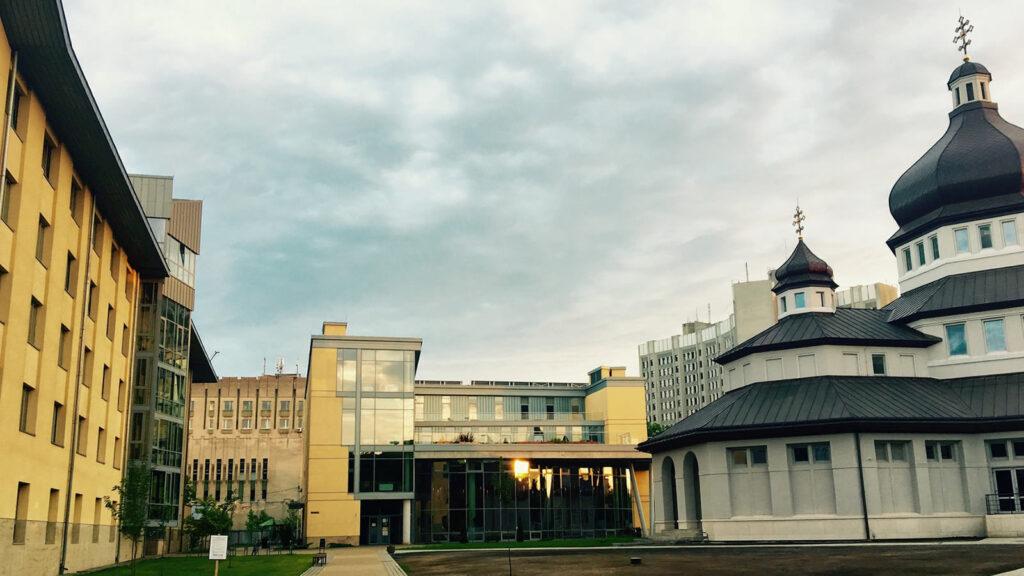The Georgetown University Berkley Center for Religion, Peace and World Affairs, a research center dedicated to fostering religious dialogue, hosted a panel discussion on protecting religious freedom in Ukraine on Jan. 30.
Eric Patterson, president of the Religious Freedom Institute, an organization focused on the acceptance of religious liberty as a human right, moderated the Jan. 30 discussion. The panel featured José Casanova, professor emeritus in sociology at Georgetown University; Borys Gudziak, an archbishop in the Ukrainian Catholic Church; Nadieszda Kizenko, a professor of Russian and East European history at the University at Albany; Frank Sysyn, a professor of history and classics at the University of Alberta; and Catherine Wanner, a professor of history and anthropology at Pennsylvania State University.
Gudziak said that religious freedom is under threat in Ukraine due to the Russian invasion.
“Everytime there is a Russian aggression, historically over the last three centuries, and over the last years, a Russian involvement, a Russian occupation, leads to some kind of religious oppression,” Gudziak said at the event. “Particularly this is true for Ukrainian Catholics.”
Ukrainian President Volodymyr Zelensky recently announced that his government would be seeking to prevent religious organizations with ties to Russia from operating within Ukraine. Zelensky specifically targeted the Ukrainian branch of the Orthodox Church, ordering an inquiry into the organization’s relationship with the Russian Federation.
While Patriarch Kirill, the leader of the Russian Orthodox Church, has voiced the church’s support for Vladimir Putin and the Russian invasion of Ukraine, Gudziak said it is important to question whether his views reflect that of the church’s followers and the religion as a whole.
“If an Orthodox person says something, is that Orthodox teaching? In other words, if Patriarch Kirill is saying something, does that make it Orthodox theology?” Gudziak said.
Wanner said that the scope of the problem of religious persecution goes beyond just the Russian Orthodox Church, though.

“The support for this war is not only audible but visible, it has been actively demonstrated not just by Patriarch Kirill, but by other members of the Russian Orthodox Church, and even by, for example, some of the other religious denominations that similarly pledge an allegiance to the Russian state,” Wanner said at the event.
Gudziak said that although war is a sin in Christianity, defending Ukraine with military force is imperative.
“If you don’t include complete pacifist conviction, the Christian position is analogous: war is terrible, war is sin, starting war is the greatest sin, but you are called to defend the innocent,” Gudziak said. “Somebody who is defending the innocence, who is defending one’s self, one’s land, one’s freedoms, one’s dignity, has not only the right but the responsibility to do so.”
Wanner said that it is natural for Ukrainian authorities to want to use all possible strategies to win the war, including by suppressing Russia-affiliated religions, but holding back could prove to be a stronger choice in the long run.
“In the heat of a nearly year-long, punishing war that promises to be unrelenting, it’s very tempting for leaders in Ukraine to react politically for short-term advantage, and to try to transform all potential forms of soft power into weapons to try to fortify Ukrainian sovereignty,” Wanner said. “However, it’s never really been more important than it is now to make decisions strategically, not necessarily reactively.”
Casanova said the Ukrainian government and religious organizations have a responsibility to create and maintain spaces for diverse religious traditions and dialogues, even in times of war.
“We must be careful, we must be vigilant and critical to protect the unique model of religious pluralism that has emerged in Ukraine,” Casanova said. “This is a task, and in this aspect I think all the religious communities and all the churches have something positive – a contribution to make.”
Gudziak said that as long as the Russian invasion persists, religious freedom will remain under threat in the country.
“The biggest threat to religious freedom in Ukraine is Russian occupation,” said Gudziak. “We’ve seen it happen with our own eyes in recent years, in recent months.”





















